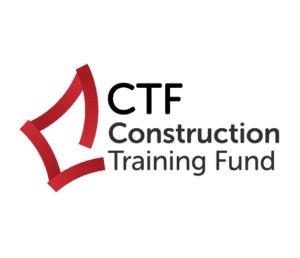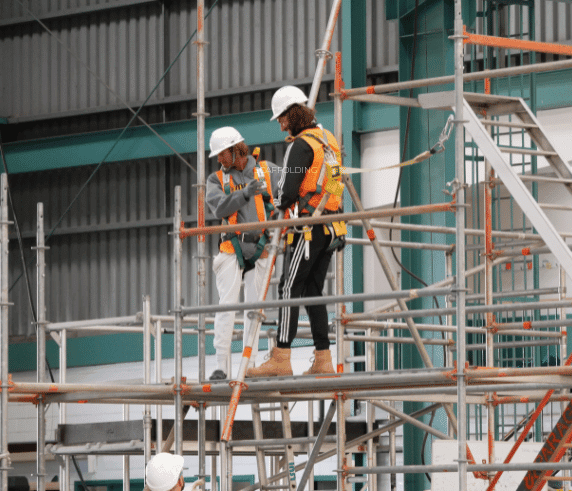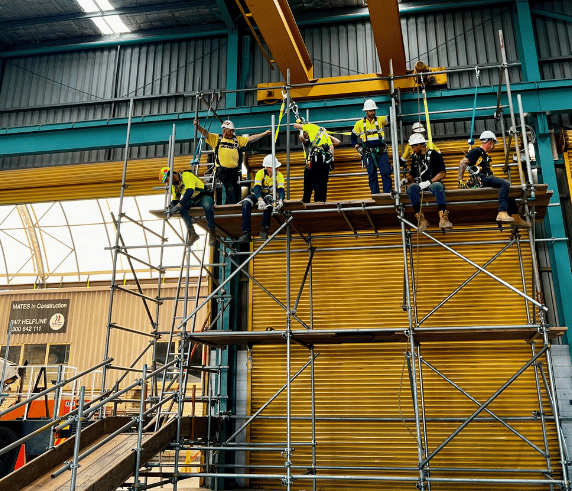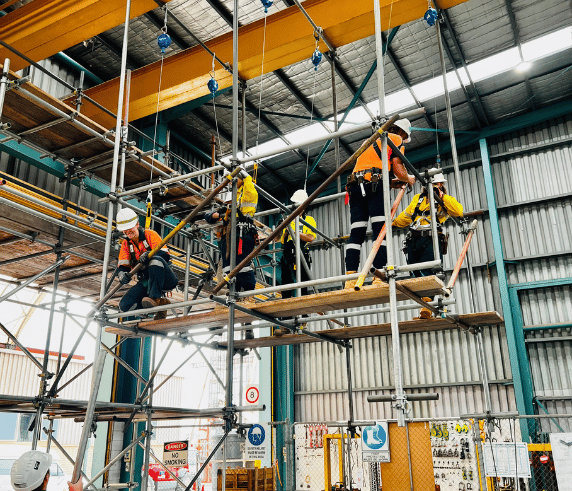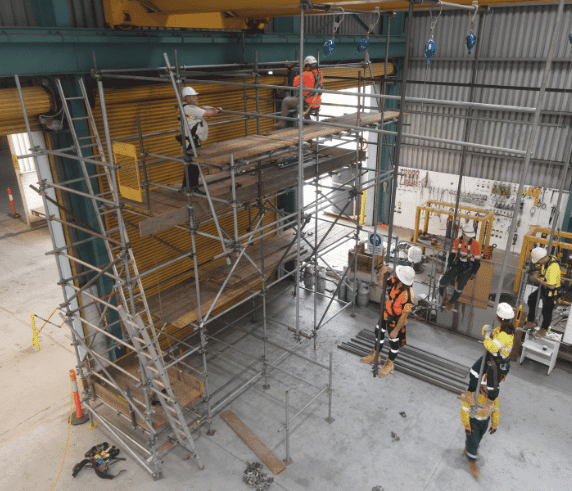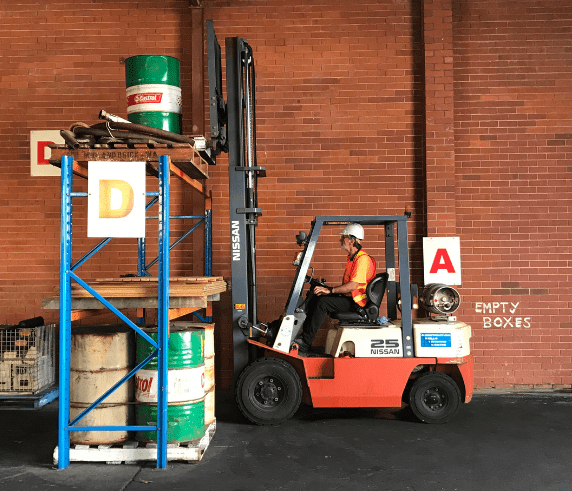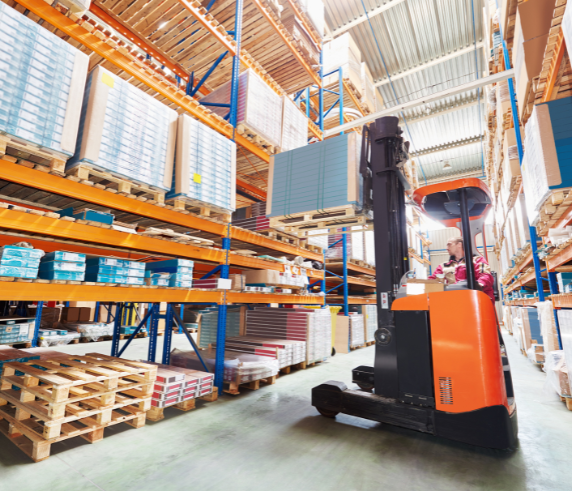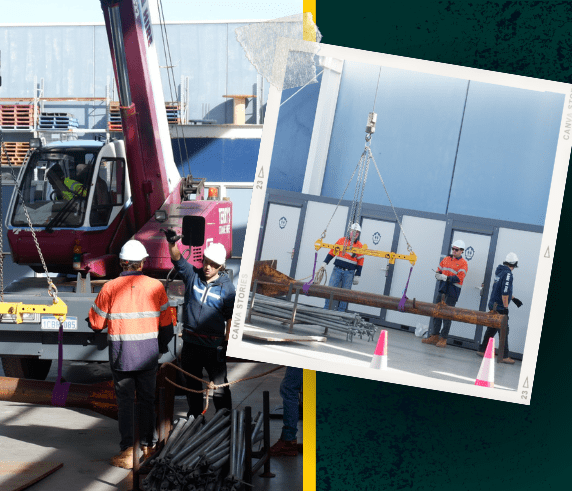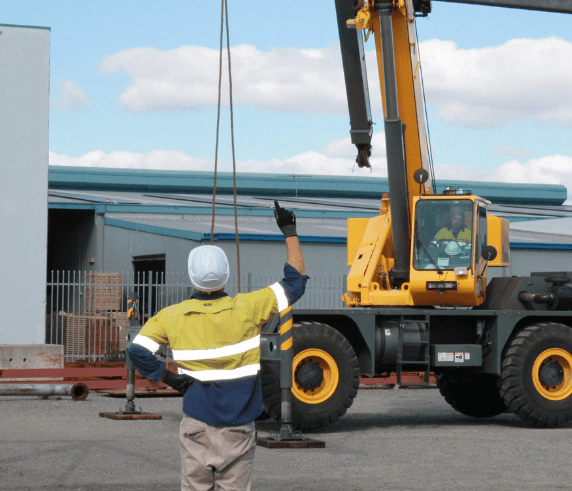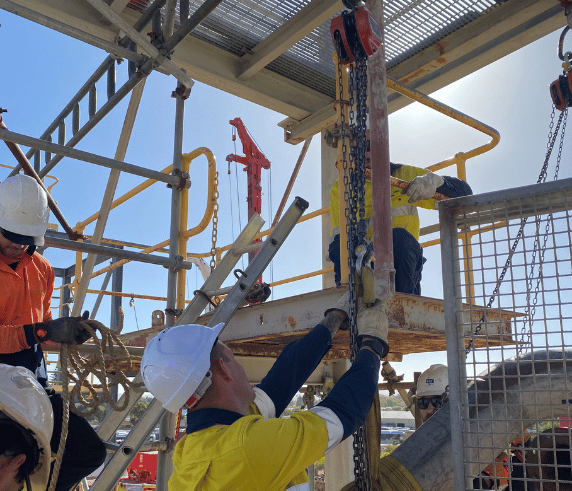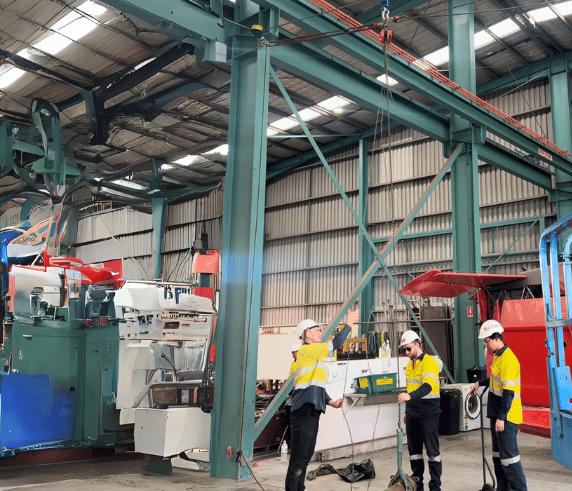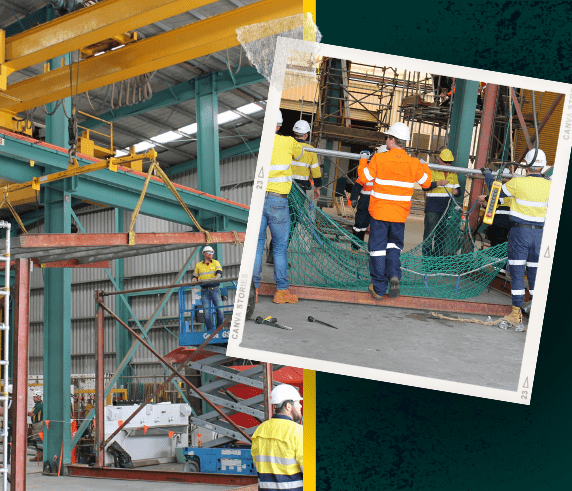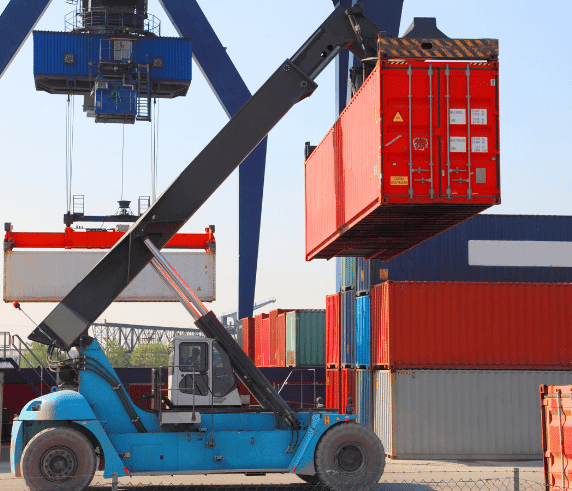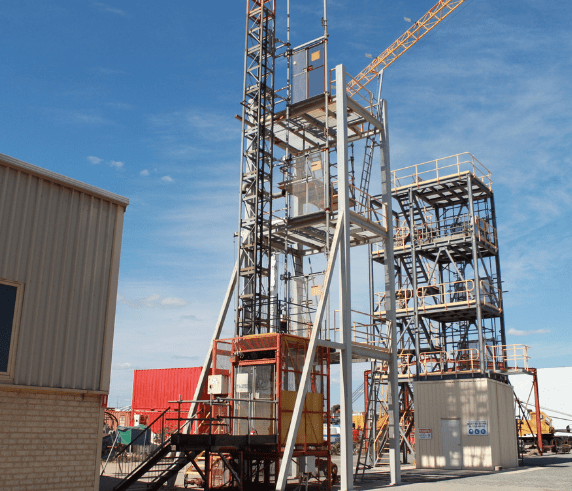All necessary requirements are detailed in the “Entry Requirements” section above. If you are unsure, please submit a ticket by clicking the “Enquire Now” button.
Duration
4 Days (7:30 AM – 3:30 PM)
Cost
$1350
Location
Accredited
Funding
Pre-Requisite
Available Intakes
Rigging IntermediateSave More with Combos!
| Date | Time | Location | Available Spaces | Cost | |
| 9 – 12 March 2026 | 07:30 am – 03:30 pm | 107 Radium Street Welshpool | 4 | $1,350.00 | |
| 10 – 13 March 2026 | 07:30 am – 03:30 pm | 107 Radium Street Welshpool | 10 | $1,350.00 | |
| 16 – 19 March 2026 | 07:30 am – 03:30 pm | 107 Radium Street Welshpool | 4 | $1,350.00 | |
| 23 – 26 March 2026 | 07:30 am – 03:30 pm | 107 Radium Street Welshpool | 6 | $1,350.00 | |
| 30 March – 2 April 2026 | 07:30 am – 03:30 pm | 107 Radium Street Welshpool | 9 | $1,350.00 | |
| 13 – 16 April 2026 | 07:30 am – 03:30 pm | 107 Radium Street Welshpool | 10 | $1,350.00 | |
| 20 – 23 April 2026 | 07:30 am – 03:30 pm | 107 Radium Street Welshpool | 10 | $1,350.00 | |
| 4 – 7 May 2026 | 07:30 am – 03:30 pm | 107 Radium Street Welshpool | 10 | $1,350.00 | |
| 11 – 14 May 2026 | 07:30 am – 03:30 pm | 107 Radium Street Welshpool | 10 | $1,350.00 | |
| 18 – 21 May 2026 | 07:30 am – 03:30 pm | 107 Radium Street Welshpool | 10 | $1,350.00 | |
| 25 – 28 May 2026 | 07:30 am – 03:30 pm | 107 Radium Street Welshpool | 10 | $1,350.00 | |
| 2 – 5 June 2026 | 07:30 am – 03:30 pm | 107 Radium Street Welshpool | 10 | $1,350.00 | |
| 8 – 11 June 2026 | 07:30 am – 03:30 pm | 107 Radium Street Welshpool | 9 | $1,350.00 | |
| 15 – 18 June 2026 | 07:30 am – 03:30 pm | 107 Radium Street Welshpool | 10 | $1,350.00 | |
| 22 – 25 June 2026 | 07:30 am – 03:30 pm | 107 Radium Street Welshpool | 10 | $1,350.00 | |
| 29 June – 2 July 2026 | 07:30 am – 03:30 pm | 107 Radium Street Welshpool | 10 | $1,350.00 | |
| 6 – 9 July 2026 | 07:30 am – 03:30 pm | 107 Radium Street Welshpool | 10 | $1,350.00 | |
| 13 – 16 July 2026 | 07:30 am – 03:30 pm | 107 Radium Street Welshpool | 10 | $1,350.00 | |
| 20 – 23 July 2026 | 07:30 am – 03:30 pm | 107 Radium Street Welshpool | 10 | $1,350.00 | |
| 27 – 30 July 2026 | 07:30 am – 03:30 pm | 107 Radium Street Welshpool | 10 | $1,350.00 |
CTF Funding Available
Intermediate Rigging Course in Perth Course Fee $1,350 / CTF Eligible - You Pay Only $405* Conditions Apply
Intermediate Rigging Course Perth overview
The CPCCLRG3002 – Licence to Perform Rigging Intermediate Level course in Perth WA focuses on advanced rigging techniques, including the use of cranes, conveyors, dredges, excavators, tilt slabs, demolition, and dual lifts. This Intermediate Rigging Course in Perth WA equips students with practical skills necessary for proper rigging execution and advanced operations.
Before attending this course, participants must hold a valid/current Statement of Attainment for Licence to Perform Rigging Basic Level , Licence to Perform Dogging, and a valid High Risk Work Licence (HRWL) for Rigging Basic and Dogging. If you don’t have this pre-requisite qualification, you are not allowed to join the course and Saferight has all rights to cancel your enrolment.
Students will gain both theoretical knowledge and practical application skills to:
Plan Task
- Review instructions, gather and interpret safety and workplace information
- Identify hazards, choose rigging gear, and establish communication
Select and Inspect Equipment
- Choose and check safety controls, PPE, and rigging gear
- Ensure functionality and safety of all equipment
Set Up Task
- Communicate plans and implement safety measures
- Confirm task suitability with ground and structure assessments
Undertake Intermediate Rigging
- Erect, operate, and dismantle structures
- Conduct multiple-crane lifts, install tilt-up panels, and remove structural elements
Complete Task
- Clear the area, inspect and store equipment
- Dismantle safety measures and finalize documentation
Additionally, the Roborigger Training option is included without extending the course duration or adding any extra cost. Interested participants can email bookings@saferight.com.au to opt-in after booking confirmation.
Career Opportunities
Maintenance riggers in large facilities in Western Australia are responsible for the safe and effective lifting, moving, and securing of loads using rigging equipment. These roles are crucial for ensuring the maintenance and operational efficiency of large industrial facilities, such as refineries, mining sites, and construction projects.
Rigging Intermediate Course in Perth WA Job Information
Job Roles and Responsibilities
Inspect and Maintain Rigging Equipment
Regular checks and maintenance of rigging gear to ensure safety and functionality.
Plan and Execute Lifting Operations
Coordinating with other team members to plan and safely execute lifting operations.
Safety Compliance
Adhering to strict safety protocols to prevent accidents and ensure a safe working environment.
Support Maintenance Activities
Assisting in the maintenance of facility equipment by providing rigging support for lifting and positioning heavy components.
Typical Job Locations
Perth
Many opportunities are available in and around Perth for ongoing construction and maintenance projects | (Rigger) (Construction Rigger).
FIFO (Fly-In Fly-Out)
Jobs in remote areas, especially mining sites in the Pilbara and other regions, where workers fly in for shifts and fly out during off periods.
Local Projects
Positions in urban and regional areas for both temporary and permanent roles.
Salary and Benefits
Hourly Wages
What can you earn as a Rigger in Perth? Typically, Rigger salary range from $36 to $69 per hour, depending on the level of experience and specific job requirements. Find out what you can earn as a Rigger in Perth here.
Additional Benefits
Include overtime pay, travel allowances, accommodation for remote roles, and competitive remuneration packages.
Job Opportunities
Positions are advertised on job platforms like SEEK and Indeed, where detailed job descriptions and application processes can be found. This provides a wide range of opportunities for those interested in maintenance rigging roles across various sectors in Western Australia. Additionally, Searching for jobs through a company’s career page is an excellent way to find opportunities in a specific industry or field. If you’re looking for rigging jobs in Perth, here are some currently available positions for Riggers.
Accredited Units
You will be enrolled into the following unit of competency:
Entry Requirements
To enrol in the Intermediate Rigging Course in Perth WA, participants must:
Students must hold a valid Statement of Attainment/Qualification prior to commencing this course with Saferight:
- CPCCLDG3001 – Licence to Perform Dogging
- CPCCLRG3001 – Licence to perform rigging basic level
- Applicants must hold a valid: High-Risk Work Licence OR a copy of their current Notice of Assessment (NOA), and Statement of Attainment/Certificate
- Must be 18 years old and above
- Present a valid photo I.D. on arrival
- Have a USI (Unique Student Identifier)
- Complete a short pre-enrolment process, including: Course suitability review & Language, Literacy, and Numeracy (LLN) Assessment. If you have any concerns about your LLN skills, we encourage you to contact us before enrolling.
- If you have any physical conditions that may affect your ability to complete a course, please visit a doctor and obtain a “Fit for Work” certificate, and send it to our bookings email.
- All rigging equipment will be supplied if needed, but we encourage students to bring their own rigging belts and tools.Individuals holding a student visa are not eligible to enrol in, participate in, or attend this course, whether face-to-face or online, as Saferight is not registered with CRICOS (Commonwealth Register of Institutions and Courses for Overseas Students). Student visa holders are encouraged to seek training with a CRICOS-registered institution to meet their requirements. For more information please click here.
Pre-Requisites
To enrol in the Intermediate Rigging Course in Perth WA, participants must:
- Students must hold a valid Statement of Attainment/Qualification & High Risk Work Licence prior to commencing this course with Saferight:
Before attending this course, participants must hold a valid/current Statement of Attainment for Licence to Perform Rigging Basic Level , Licence to Perform Dogging, and a valid High Risk Work Licence (HRWL) for Rigging Basic and Dogging. If you don’t have this pre-requisite qualification, you are not allowed to join the course and Saferight has all rights to cancel your enrolment.
Assessment
The Intermediate Rigging Course in Perth WA includes the following assessments:
- Theory Assessment: Testing intermediate knowledge of rigging techniques, safety protocols, and equipment handling.
- Practical Assessment: Demonstrating the ability to perform intermediate rigging tasks safely and efficiently.
Verification of competency for this course is available at Saferight. For more information, please visit our VOC Rigging Intermediate Level – Verification Assessment page.
Certification
Upon successful completion of the Intermediate Rigging Course in Perth WA, participants will receive a:
- Nationally Recognised Statement of Attainment for CPCCLRG3002 – Licence to perform rigging intermediate level
This certification is crucial for those aiming to work in intermediate rigging roles and obtain their Intermediate Rigger Course in Perth WA licence.
The Unique Student Identifier (USI) must be supplied and verified prior to issuance.
High Risk Work Licence
Disclaimer: Competence in this unit does not in itself result in a High-Risk Work Licence (HRWL) to operate this equipment or perform this skill. The course price listed excludes HRWL application fees..
A High Risk Work Licence (HRWL) is a photo ID issued to those trained and assessed as competent for high-risk.
Saferight can assist you with your High Risk Work Licence (HRWL) applications to WorkSafe. Please follow the instructions below when enrolling through our website, based on your specific needs:
For New HRWL Applications
- Select “High Risk Work Licence (New)” and “Photo (6x)” during the enrolment process.
- Important: You must select the “Photo (6x)” option when applying for a new HRWL. If you forget to select the photo option, the charge will be added manually when you attend the training.
For Transferring an Existing HRWL
- Select “High Risk Work Licence (Transfer)” and “Photo (6x)” during the enrolment process.
- Important: You must select the “Photo (6x)” option when applying for transferring a HRWL. If you forget to select the photo option, the charge will be added manually when you attend the training.
For Adding a New Class to an Existing HRWL:
- Select “High Risk Work Licence (Adding a Class)” during the enrolment process.
-
- Note: If you’re adding a class to an existing HRWL, you do not need to select the “Photo (6x)” option.
If You Want to Handle Your HRWL Applications Yourself:
- Simply proceed with your enrolment without selecting any of the HRWL options. This allows you to manage your HRWL application independently.
-
- For detailed guidance on applying for a new HRWL yourself, please visit: https://www.commerce.wa.gov.au/worksafe/apply-new-high-risk-work-licence-0
- To add a new licence class to your existing HRWL yourself, please visit: https://www.commerce.wa.gov.au/worksafe/add-class-your-high-risk-work-licence
Amenities
- COFFEE TRUCK available from 9:00am to 9:30am.
- LUNCH TRUCK available from 12:00pm to 12:10pm.
- RADIUM LUNCH BAR is less than 1 minute up the road from the Welshpool premise.
Duration
The Intermediate Rigging Course in Perth WA is available for delivery over 4 Days (7:30 AM – 3:30 PM)
Please choose the course date that best fits your preferences and availability from the enrolment table. This flexibility ensures that you can complete the Intermediate Rigger Course in Perth WA at a pace that suits your schedule.
Delivery Locations
This Intermediate Rigging Course in Perth WA is delivered at the following location:
Fees
Refer to the price listed in the enrolment table.
Group bookings/Onsite training is available at your site or ours. Please click the ‘Enquire Now’ button for further information on pricing and site requirements for the Intermediate Rigging Course in Perth WA. For our cancellation and refund policy, please refer to our Refund/Cancellation Policy.
| Title | Fee |
| Course Fee | $1,350 |
| CTF Discount | $945 |
| You Only Pay The Gap | $405* |
CTF subsidy is granted to those who meet the eligibility criteria, more information can be found here: CTF Eligibility Criteria PDF Guide.
Main eligibility criteria include: Reference and project details of 6 months of construction work in WA out of the past 12 months prior to your course commencement with Saferight. For more information about Saferight’s CTF process, please click here. If student is deemed eligible for CTF, there will be a separate administrative fee of $30.
Apply For CTF Funding
Available Funding
Advanced Rigging Course
Next Steps
DISCLAIMER
We offer Certificate IV in Training & Assessment qualification now. Click here for more details.
Available Intakes
Rigging IntermediateSave More with Combos!
| Date | Time | Location | Available Spaces | Cost | |
| 9 – 12 March 2026 | 07:30 am – 03:30 pm | 107 Radium Street Welshpool | 4 | $1,350.00 | |
| 10 – 13 March 2026 | 07:30 am – 03:30 pm | 107 Radium Street Welshpool | 10 | $1,350.00 | |
| 16 – 19 March 2026 | 07:30 am – 03:30 pm | 107 Radium Street Welshpool | 4 | $1,350.00 | |
| 23 – 26 March 2026 | 07:30 am – 03:30 pm | 107 Radium Street Welshpool | 6 | $1,350.00 | |
| 30 March – 2 April 2026 | 07:30 am – 03:30 pm | 107 Radium Street Welshpool | 9 | $1,350.00 | |
| 13 – 16 April 2026 | 07:30 am – 03:30 pm | 107 Radium Street Welshpool | 10 | $1,350.00 | |
| 20 – 23 April 2026 | 07:30 am – 03:30 pm | 107 Radium Street Welshpool | 10 | $1,350.00 | |
| 4 – 7 May 2026 | 07:30 am – 03:30 pm | 107 Radium Street Welshpool | 10 | $1,350.00 | |
| 11 – 14 May 2026 | 07:30 am – 03:30 pm | 107 Radium Street Welshpool | 10 | $1,350.00 | |
| 18 – 21 May 2026 | 07:30 am – 03:30 pm | 107 Radium Street Welshpool | 10 | $1,350.00 | |
| 25 – 28 May 2026 | 07:30 am – 03:30 pm | 107 Radium Street Welshpool | 10 | $1,350.00 | |
| 2 – 5 June 2026 | 07:30 am – 03:30 pm | 107 Radium Street Welshpool | 10 | $1,350.00 | |
| 8 – 11 June 2026 | 07:30 am – 03:30 pm | 107 Radium Street Welshpool | 9 | $1,350.00 | |
| 15 – 18 June 2026 | 07:30 am – 03:30 pm | 107 Radium Street Welshpool | 10 | $1,350.00 | |
| 22 – 25 June 2026 | 07:30 am – 03:30 pm | 107 Radium Street Welshpool | 10 | $1,350.00 | |
| 29 June – 2 July 2026 | 07:30 am – 03:30 pm | 107 Radium Street Welshpool | 10 | $1,350.00 | |
| 6 – 9 July 2026 | 07:30 am – 03:30 pm | 107 Radium Street Welshpool | 10 | $1,350.00 | |
| 13 – 16 July 2026 | 07:30 am – 03:30 pm | 107 Radium Street Welshpool | 10 | $1,350.00 | |
| 20 – 23 July 2026 | 07:30 am – 03:30 pm | 107 Radium Street Welshpool | 10 | $1,350.00 | |
| 27 – 30 July 2026 | 07:30 am – 03:30 pm | 107 Radium Street Welshpool | 10 | $1,350.00 |
I’ve gone through all my HRW training through Saferight. Absolutely wonderful trainers!!
Very good happy place to do your training, the instructors are just lovely.. very professional, they made you feel welcome and relaxed , answered all my questions, very satisfied
Best training center around Perth, quality, educational and best value for money course!
Very knowledgeable and enjoyable as far as training courses go, would recommend to anyone interested in furthering their training.
I had the privilege of attending the Advanced Scaffolding course at Saferight Training, and let me tell you, it was an absolute blast!
Confined spaces was great all the trainers are experienced and competent here
Finished a Tele-Handler course here a few weeks ago, and after finishing a rigging course at one of the other major training companies in Perth I have to say Saferight is definitely the better of the two..
Very good experience and the training was informative, the instructor presented well. The practicals were set up really well also
The 4WD course was very informative, particularly the practical aspect which developed fundamental skills for traversing rough terrain!
Very interesting course. Gives you confidence in learning to trust the vehicles and confidence in driving off-road - 4WD.
Frequently Asked Questions
-
-
If you see a green tick under ‘Funding’ at the top of the page and a ‘CTF Funding Available’ box beneath the enrolment table, the course is funded by CTF. If these indicators are absent, the course is not CTF-funded. For more information about CTF, click here.
-
All courses run at Saferight are Nationally Accredited in Australia, except for permit issuers, Height Safety Supervisor, and courses under the VOC category.
-
This course does not include a High Risk Work Licence (HRWL). However, you can choose an additional option during enrolment for us to manage your HRWL application to WorkSafe. Otherwise, you must apply directly to WorkSafe.
-
Your certificate will be available in 2-3 business days after you’ve completed the course. Our admin team will also send you the PDF version via email. If you have any inquiries related to your certificate, please click the ‘Enquire Now’ button.
-
Individuals holding a student visa are not eligible to enrol in, participate in, or attend any of our courses, whether face-to-face or online. Because Saferight is not registered with CRICOS (Commonwealth Register of Institutions and Courses for Overseas Students). Student visa holders are encouraged to seek training with a CRICOS-registered institution to meet their requirements.
Related Posts
-
Saferights Dogging course is one of our most popular courses, and for good reason! Dogging is a vital role in the construction and industrial sectors, ensuring safety and efficiency in lifting operations. If you’ve ever wondered about the specifics of what a dogman does, how it differs from rigging, and how to become a qualified dogman, you’re in the right place. This guide will walk you through everything you need to know about Dogging.
What is Dogging?
What exactly is dogging? Dogging is the process of directing and managing the safe lifting and movement of loads using cranes and other lifting equipment. The term “dogging” originates from the practice of guiding and controlling the movement of loads, akin to how a dogman (or dogger) would manage and direct lifting operations. Dogging requires technical knowledge, strong communication skills, and practical expertise when handling loads safely and efficiently.

Key aspects of dogging include:
- Lifting Equipment Coordination: Collaborate closely with crane operators and riggers to use lifting equipment correctly and safely.
- Communication: Using hand signals or radios to provide clear instructions to crane operators and other team members during lifting operations.
- Safety Monitoring: Follow all safety protocols and procedures to prevent accidents and maintain a safe working environment.
- Transport and Logistics: Handle and transport large goods or containers in warehouses or logistics hubs.
- Shipyard and Dock Operations: Lift and maneuver large parts or vessels into place in shipyards.
What does a Dogman do?
A dogman, also known as a dogger, plays a crucial role in ensuring the safe and effective movement of loads on construction sites and industrial environments.
The primary responsibilities of a dogman include:
- Directing Cranes and Lift Operations: Using hand signals or radios to communicate with crane operators and guide the lifting and placement of loads.
- Load Calculation and Assessment: Evaluate the weight and stability of loads to ensure they are securely fastened before lifting.
- Securing Loads: Attaching and detaching loads using various rigging techniques, including slings and chains.
- Safety Compliance: Ensuring that all lifting operations adhere to safety regulations and standards to prevent accidents.
What are the benefits of becoming a Dogman?
Becoming a qualified dogman offers numerous benefits, from enhancing safety and compliance to opening up job opportunities and increasing earning potential. Knowing how to perform your duties correctly not only boosts your confidence but also ensures the safety of everyone on site.
Employers consider dogging skilled labor, which typically commands higher hourly rates than unskilled work. Additionally, proper technique in dogging is less physically demanding than general labour, making it suitable for a wide range of ages, from young workers to experienced professionals. (Please note: You must be 18 years or older to obtain a DG licence in Australia.)
Whether you’re new to construction or already in the field, obtaining a Dogging ticket can significantly improve your career prospects. This qualification is also valuable in industries beyond construction, including transport, mining, and other heavy sectors.
What is a Dogging Licence?
You need a Dogging licence (Licence to perform dogging – CPCCLDG3001) to legally perform dogging tasks. It demonstrates that an individual has the necessary skills and knowledge to handle lifting operations safely. The dogging licence is governed by the National High Risk Work Licence (HRWL) framework in Australia, ensuring that workers doing this role are properly trained and assessed.
To obtain a dogging licence, candidates must:
- Complete a Training Course: Enrol in a nationally recognised dogging course that covers both theoretical and practical components.
- Pass a Competency Assessment: Successfully complete an assessment that evaluates your ability to perform dogging tasks safely.
- Apply for the Licence: Submit an application to the relevant state or territory authority, including proof of training and assessment.
Who needs a Dogging licence?
A dogging licence is crucial for roles that involve lifting and moving heavy loads. Jobs that require a dogging licence include:
- Construction Site Dogman: Operating on building sites, ensuring that cranes and other lifting equipment safely move construction materials and equipment.
- Industrial Crane Operator: Working in factories or industrial plants, where precise lifting and placement of heavy machinery or materials are necessary.
- Mining Operations: Heavy machinery and equipment need to be lifted and positioned safely In the mining industry.
- Transport and Logistics: In warehouses or logistics hubs, where large goods or containers are handled and transported.
- Shipyard and Dock Operations: In shipyards, where large parts or vessels are lifted and maneuvered into place.
Dogman vs. Rigger: What’s the Difference?
While both dogmen and riggers play essential roles in lifting operations, their responsibilities differ significantly:
Dogman
Dogman focuses primarily on the safe movement of loads, including directing crane operators, securing loads, and ensuring compliance with safety regulations. Dogmen work closely with crane operators to ensure that loads are lifted and placed correctly.
Rigger
Specialises in the setup and dismantling of rigging equipment, such as hoists, pulleys, and slings. Riggers are responsible for preparing the equipment used in lifting operations, ensuring that it is correctly installed and capable of handling the loads.

In summary, a dogman manages the operational side of lifting and securing loads, while a rigger prepares and sets up the equipment used for these operations.
How to Become a Dogman
1. Gain a Qualification for Dogging
If you wanted to become a Dogman the first step is to start your training to gain the necessary skills from a training organisation. There are a few pathways to gain the necessary training involved to become a Dogman, however, Registered Training Organisations (RTO’s) offer the most comprehensive unit of competency is (Licence to perform dogging – CPCCLDG3001). This is usually 4–5-day course that leads to a licenced outcome. It includes theoretical and practical training. You’ll need to complete a portfolio of work to be competent in that unit.
Saferight Training Academy is an RTO that offers top-tier courses in Western Australia, designed for all skill level. Enrol our dogging course (Licence to perform dogging – CPCCLDG3001) to gain the necessary skills and knowledge needed.2. High Risk Work Licence (HRWL) for Dogging
- Why It’s Important: After completing the necessary training and earning your qualifications, the next crucial step is obtaining a High-Risk Work Licence. This licence is mandatory for performing Dogging work in Australia, ensuring that only trained and competent individuals are allowed to perform high-risk tasks.
- How to Obtain the Licence: You can apply for this licence through WorkSafe or via the training organisation where you completed your scaffolding qualification. Saferight has this service with a additional fee, this makes it easier for you to get licensed and start working right after your qualified.
3. Obtain a white card
- What is a White Card? The White Card, or also known as the ‘Construction Induction Training Card’, is an essential certification for anyone intending to work in the construction industry in Australia. It proves that you have completed the necessary general construction induction training, focusing on workplace health and safety (WHS) standards.
- Why is it Important? Without a White Card, you cannot legally work on a construction site in Australia. It ensures that all workers understand the fundamental safety practices required to maintain a safe working environment, reducing the risk of accidents and injuries on site.
- How to Get a White Card: To obtain your White Card, you must complete a short course provided by a registered training organisation (RTO). The course typically takes a day and covers essential topics such as identifying and managing risks, understanding safety laws, and knowing how to respond to potential hazards.
- Where to Apply: White Card courses are widely available across Australia, and usually offered by Registered Training Organisations. ‘Prepare to work safely in the construction industry – CPCCWHS1001’ is what you need to search for. After completing the course successfully, you’ll get a White Card that is recognised across the country, allowing you to work on any construction site in Australia.
4. Additional Tickets
Having a Dogging ticket and your white card is a great way to start out, but having additional tickets under your belt makes you a more desirable candidate if you’re looking for work in the mining and construction industry. For more information on additional High-Risk course, view our course categories.
5. Start Building Your Resume
With all the necessary licences and qualifications in hand, it’s time to start building your resume. Many companies are open to hiring individuals with little to no experience, often providing on-the-job training as you embark on your career. This is a great opportunity to gain practical experience and grow your skills in a real-world environment.
Looking to Start Your Dogging Career?
If you’re ready to become a qualified dogman and take on this crucial role in the construction and industrial sectors, Saferight Training Academy has the perfect courses for you. Our dogging course is built to provide you with knowledge and skills for certification needed to excel in this field.
Enroll in Saferight’s Dogging Course Today!
By choosing Saferight, you’ll benefit from expert instructors, hands-on training, and a nationally recognised qualification that sets you on the path to a successful career. Don’t miss out on the opportunity to become a skilled dogman and enhance your career prospects. Let’s get started on your journey to becoming a qualified dogman!
-
Roborigger has partnered with WA’s largest safety training facility, Saferight Training (RTO 5722) to incorporate Roborigger load control and orientation device training as part of its high-risk rigging, dogging, and crane operator courses.
With 31 years of experience offering high-risk, height safety and confined space safety training at its purpose-built training facilities around WA, Saferight is proud of its reputation for bringing in exposure to the latest technologies as part of its courses. Training personnel to work safely and use the best available tools and equipment is aligned with Roborigger’s mission to drive cultural change for safer and more efficient crane lifting practices.
Through the partnership with Saferight, any personnel enrolled in Saferight basic or advanced rigging, dogging, or crane operator’s courses will be given an introduction to Roborigger and will also have the opportunity to opt-in for Roborigger operator training at no extra cost and without extending the usual timeframe of the courses.
Saferight Founder and Managing Director Mack McCormack said that by incorporating this new concept in the high-risk work sector for dogmen, riggers and crane operators, students will be well equipped with new rigging skills to increase safety and productivity levels in their workplace.
“Employers are fulfilling their duty of care to their employees whilst providing their employees with the most updated construction technology as well as the safest method to rig and load in the construction and mining industry. Ultimately, students are the overall winners as they increase their qualifications with skills in updated technology without additional cost.”, says McCormack.
“Our collaboration with Saferight is part of our critical mission to shift the culture in crane lifting. Offering the Roborigger training for free as part of the rigging and dogging courses means we can accelerate industry-wide adoption of safer and more efficient crane lifting where taglines are no longer required, and where we no longer need to put people in the line of fire.”, says Roborigger founder and Managing Director Derick Markwell.
Related Courses
This Basic Scaffolding Ticket Perth Course covers erecting, altering, dismantling basic scaffolds, using modular/pre-fabricated scaffolds, materials hoists (max 500kg), ropes, gin wheels, safety nets, static lines, and bracket scaffolds for licensing.
This Intermediate Scaffolding Course Perth covers erecting, altering, dismantling intermediate-level scaffolds including cantilevered platforms, spurred scaffolds, barrow ramps, safety screens, mast climbers, and tube and coupler scaffolds for licensing.
This Advanced Scaffolding Course Perth (CPCCLSF4001) covers erecting, altering, dismantling advanced scaffolds, including all intermediate tasks, plus hung and suspended scaffolds, for licensing.
This Intermediate and Advanced Scaffolding Course Perth teaches erecting, altering, dismantling at advanced levels, encompassing all intermediate tasks and specialised work with hung and suspended scaffolds for licensing.
Based on the National Standard for High Risk Work Licensing, this course trains individuals to operate boom-type elevating work platforms (EWP) with booms over 11 metres.
This Forklift Licence in Perth WA course is based on the requirements of the National Standard for Licensing Persons Performing High Risk Work. Perfect for those seeking a Forklift Ticket in Perth (LF) via comprehensive Forklift Training in Perth
This Order Picker Forklift Licence in Perth WA course will equip you with the skills and knowledge to navigate tight spaces, use the platform lift system, and handle goods safely using an order picking forklift as per the national code TLILIC0004.
This Dogging and Rigging basic Course in Perth trains students for a licence in mining or construction. It covers everything from equipment movement to steel erections, expert slinging techniques, lifting gear selection, and effective crane operation.
This Dogging course in Perth WA trains students for a licence in mining or construction. Covering slinging techniques, lifting gear selection, inspection, and crane operator direction for load movement, especially when the load is not visible.
The Rigging Course Perth at Saferight covers basic rigging for plant/equipment movement, steel erections, hoists, pre-cast concrete placement, safety nets/lines, perimeter screens, shutters, and cantilever crane platforms. This Basic Rigging Course Perth is ideal for those aiming to obtain a Riggers Ticket and work in the construction or industrial sectors.
The Advanced Rigging Course Perth at Saferight is designed for those looking to expand their rigging skills to an advanced level. This course is ideal for individuals aiming to obtain an Advanced Rigger Course Perth certification, teaching skills for basic and advanced rigging, including cranes, conveyors, dredges, excavators, tilt slabs, demolition, and dual lifts.
The Basic and Intermediate Rigging course teaches how to move plant and equipment, steel erection, hoists, pre-cast concrete placement, safety nets, static lines, and cantilever crane loading platform, cranes, conveyors, dredges, excavators, tilt slabs, demolition, and dual lifts.
This Rigging course, encompassing Intermediate and Advanced levels covers rigging skills for cranes, conveyors, dredges, excavators, tilt slabs, demolition, and dual lifts.
This Reach Stacker course applies to the activities of a person operating a reach stacker greater than 3 tonnes capacity that incorporates an attachment for lifting, moving and travelling with a shipping container
Join our Material Hoist Perth WA course to Operate a Materials Hoist. Provides skills on how to safely operate a materials hoist, a device for lifting goods, not people, using a car, bucket, or platform that moves up and down a structure’s exterior. Ideal for those seeking a Hoist Operator Ticket / Hoist Ticket Perth training.
This Operate Personnel and Materials Hoist course provides skills to operate builders’ hoists for hoisting personnel, goods, materials, covering car, structure, machinery, cantilever, tower hoists, and multiple winch operations.
Have some questions?
If you have any questions related to the Intermediate Rigging Course Perth please click the enquiry form button
